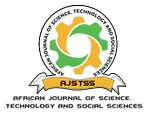Determination of the effect of human capital on service quality of accredited universities in Kenya.
DOI:
https://doi.org/10.58506/ajstss.v1i1.45Keywords:
Human Capital, Service Quality, Human Capital Development, Higher Education, Strategic LeadershipAbstract
Design/Methodology- this study was guided by the positivist domain which is a major doctrine or theory in social sciences largely used in survey types of research. The study employed both cross-sectional research design and explanatory research design. The target population comprised the 74 public and private universities in Kenya. The sample size was 222 respondents. The main data collection tool was a questionnaire. Both descriptive and inferential statistics were used to analyze the data Findings- the study established that human capital had a significantly positive relationship with service quality. Human capital explained about 38% of the variation in service quality of accredited universities in Kenya. Practical Implications- The human capital such as strategic leaders in universities should be aligned and increase their adoption of strategic leadership practices in order to inspire good managerial practices in universities. Additionally, the finding that human capital affects service quality is consistent with the Upper Echelons theory. This theory offers a framework for viewing leaders as wise, experienced and educated change agents who serve as a critical asset capable of enhancing service quality in their institutions.


